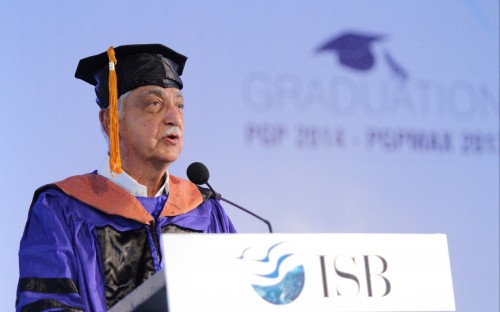At 68, Azim has lost none of his passion to lead a multi-billion dollar company. His delivery to the Indian School of Business’s graduates may have lacked bite, but he commanded no less respect.
Azim, who has been at the helm of Wipro since the late ‘60s, is standing in front of 600 MBA and Executive MBA school-levers. A couple of feet away, ISB's board sit in silence.
He was an engineering graduate from Stanford, a top university in the United States. When he returned home, Wipro was a minor league cooking-fat company. But, today, Wipro group’s revenues are in the region of $8 billion, and the company casts a corporate shadow over 60 countries and is listed on the NSE.
“I can hardly remember any decisive turning point that came from some single big idea or great innovation,” said Azim from centre-stage. “Everything was built with steady, painstaking work.”
Today, India’s next generation will celebrate graduating from India’s best-ranking business school. They will drink late into the night after securing the country’s most prestige degree. MBA jobs will be a fitting conclusion to their 12 and 24 month narratives.
Celebrations may be muted, however. “There is extraordinary inequality, deprivation and injustice all around us,” Azim deadpanned. “And I think we need to be conscious of this reality, because it is highly intelligent and capable people like you who are key to making our country better.”
India’s general election kicks off today, which takes place over a period of six weeks. More than 800,000 people will have a ballot. Some of the country’s 4,000 business schools will be hoping that the results pave the way to more stability.
India is an emerging economy and has in recent years enjoyed healthy economic expansion. But when that growth started to slow, eyebrows were raised.
A number of schools cited concerns over MBA job prospects, as the degree becomes overtly common and closes the gap between undergraduate and post-graduate business education.
“2013 was quite sluggish as far as economic growth in India is concerned, and therefore I am not surprised that recruitment and salaries were dull in 2013,” said Amit Karna, an academic director of EBS Business School.
Wipro has been hiring droves of MBA graduates since 1975. Their business school engagement program cherry-picks the crème of the crop from the premier schools. ISB is no doubt included. Wipro employ more than 140,000 people for their IT services business alone.
The company racked up net income of $325 million in the third quarter of 2013, an increase of 27 per cent year-on-year. IT services revenue was $1,678.4 million, a sequential increase of 2.9 per cent and year-on-year increase of 6.4 per cent.
When the data was released in December, Suresh Senapaty, Chief Financial Officer of Wipro, said: “Our investments in automation and productivity tools have driven efficiencies and helped us expand margins of IT services by 54 basis points to 23 per cent.”
Yet MBA graduates in India have to settle for less. Indian citizens who graduated from full-time two-year MBA programs reported a starting salary of just $34,988 last year, significantly lower than in Western countries.
Meanwhile, Azim only sought to recruit from the “very best” business schools. “At that time that meant IIM Ahmedabad,” he said, recalling his first hiring drive in the mid ‘70s. “I was then about as old as some of you are today.”
Wipro was a start-up in the vegetable oil business, trying to diversity into soap manufacturing. It was a company that no one had heard of. “You can imagine how presumptuous I must have appeared to the Management at IIM,” Azim laughed.
“Hindustan Lever, the leader in our product category, and other similar blue chip companies, were clearly the places which business school graduates wanted to join. Suffice to say we were not taken seriously.”
Azim was driven to build an organization deeply committed to values. He believed success in business would eventually follow. Those values remain at the core of the company today.
Last month, the Ethisphere Institute named Wipro as the world's most ethical company for the third successive year. Anurag Behar, Wipro’s chief sustainability officer, said: “Ethics, integrity and responsible citizenship have always been at the core of how we think and act.”
Such is their commitment to sustainability and ethical values that Azim urged ISB’s graduates to focus on the “ordinary”. “In the world of today… we seem to be getting into a mode of thinking that success comes from extraordinary things,” he said. “My experience suggests that this is quite wrong.”
In 2001, he established and endowed the Azim Premji Foundation, a non-profit which enhances the quality in India's public education system.
“Business schools graduates who joined us were given a clear understanding of the company they were joining. We made sure that they knew exactly what Wipro stood for,” said Azim.
Wipro's chairman is worth more than $15 billion, according to Forbes, and is India's fourth richest businessman. But it is hard-work and perseverance that will allow MBAs to achieve his feats – not innovation.
“What really builds and sustains success are the much ignored ordinary things,” said Azim. “The three ordinary things that we often don’t pay enough attention to, but which I believe are the drivers of all success are: hard-work, perseverance and basic honesty.”
Despite the enthusiasm for sustainability, which is shared by many Indian MBAs, poverty is still rife in the country. Azim just returned from Surpur, a four-hour drive from ISB's Hyderabad campus, where his educational foundation is based.
He observed children who were too young to be in school, but whose parent’s hands were forced because there was no one to look after them. Many of the villages’ adults are hired for labour work in the farming fields.
“To me it seems that all of us here are privileged, some more some less,” said Azim. “I think that privilege gives us not only a responsibility, but an opportunity to help those around us who face inequity, injustice and deprivation.”
It all sounds a bit bleak. Azim, however, delivers a compassionate ending note. “I do believe that if each of us does whatever we can, within our capability, capacity and our constraints, to reach out to even one of our fellow underprivileged citizens, it can make an enormous difference to our country,” he said.
It would seem an Indian MBAs dream career is one of not just success, but one that makes the country a better place.
RECAPTHA :
3c
05
df
71








